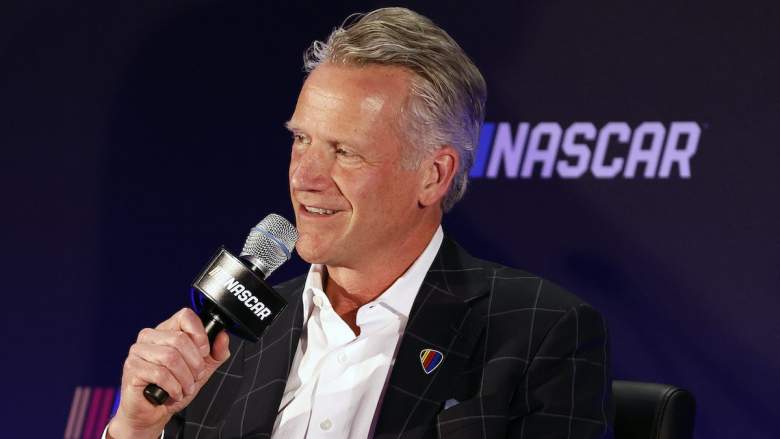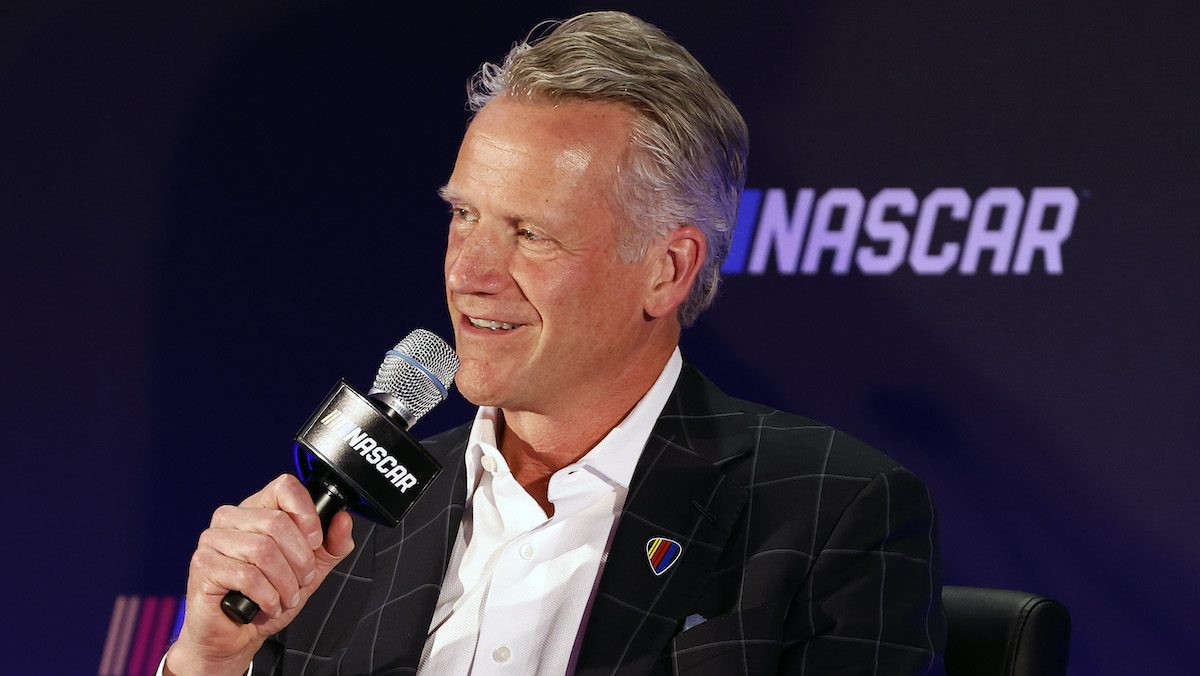
Getty
NASCAR President Steve Phelps talks to the media.
NASCAR president and now commissioner Steve Phelps recently addressed one of the sport’s biggest challenges: star power. While today’s drivers are talented, they haven’t captured fans’ imaginations the way Richard Petty, Dale Earnhardt, and Jeff Gordon once did in the NASCAR golden era.
In an interview with Axios, Phelps was clear: the sport must “make heroes” out of drivers. He emphasized that connecting racers to fans is critical, not just for filling seats, but for reigniting the passion that made NASCAR a cultural force during its most popular decades.
The Glory Days of Star Power
NASCAR basically used to be carried by star power, as icons like Richard Petty, Dale Earnhardt, and Jeff Gordon attracted huge numbers. At that time, the sport was not simply about cars; it was about characters. Every driver possessed a specific image, such as a cool restraint of Petty, knowing presence of Earnhardt, and new girlishness of Gordon, that turned them into cultural icons.
Spectators went to the teams, the contests were personal, and the races were events that it was essential to have seen. This emotional attachment formed loyalty and assisted in making casual watchers become fans of their lives.
Parity Changed Everything for Steve Phelps
However, there has been an increase in stricter rules and balance, as noted by Neha Dwivedi of the Sports Rush, which has rendered it more challenging on the part of modern drivers to dominate, cutting the larger-than-life appeal enjoyed by the sport.
The current vehicles on the roads are connected to the internet; however, with standard car models and high constraints in the sphere of marketing, this has decreased the number of people.
In response, NASCAR is making investments in content development to attract fans, which helps reach out to new participants, presenting them with a behind-the-scenes glimpse into loyal followers and new ones with new entry points to expand on-track attendance and engagement. That is making NASCAR stars.
Such changes in the structure of the sport have also undermined old rivalries. Having the wins more spaced out on the field, there is no single driver who always takes most of the headlines as Petty or Earnhardt used to do. Long winning streaks or resentful rivalries, which once formed the storytelling of NASCAR, have become more challenging in the new age.
Steve Phelps Gets Real
Phelps recognizes the problem. Speaking with Axios’ Sara Fischer, he highlighted efforts like the driver ambassador program launched this year.
“So, I think for us, we started this thing this year called the driver ambassador program. Essentially, it pays drivers to build their own brands, which is kind of a neat idea… It’s working,”
Phelps explained. The initiative has already boosted driver-centered content by nearly 50%, increasing visibility and helping personalities shine outside the car.
Still, Steve Phelps insists that hero-making must go beyond marketing.
“We need to make heroes of these drivers, and then the relationships that we have with our media partners, they need to help us do that as well, because you strap into a 3,500 lb car, it’s dangerous, and these guys are heroes in their own right.”
It’s a reminder that racing is inherently risky, and those who take on that danger deserve recognition.
Building the Future
As a way forward, NASCAR is betting hard on storytelling. It is planned to bring the fans nearer to the action and personalities, be it in terms of documentaries, social platforms, or a kind of in-person experience. This emphasis on drawing up an idea of who drivers are, not merely what they do during Sundays, would restore the emotional connection with which its legends used to be made memorable to people.
To Steve Phelps, reestablishing that sense of heroism is the most important for the growth of NASCAR. When the sport can once again get the star moonthronging, everything will not be used to entertain, it will be used to inspire the coming generation of fans.
Dogli Wilberforce is a sports writer who covers NASCAR, Formula 1 and IndyCar Series for Heavy Sports. With bylines at Total Apex Sports and Last Word on Sports, Wilberforce has built a reputation for delivering timely, engaging coverage that blends sharp analysis with accessible storytelling. Wilberforce has covered everything from major football transfers to fight-night drama, bringing readers the insight and context behind the headlines. More about Dogli Wilberforce
More Heavy on NASCAR
Loading more stories

